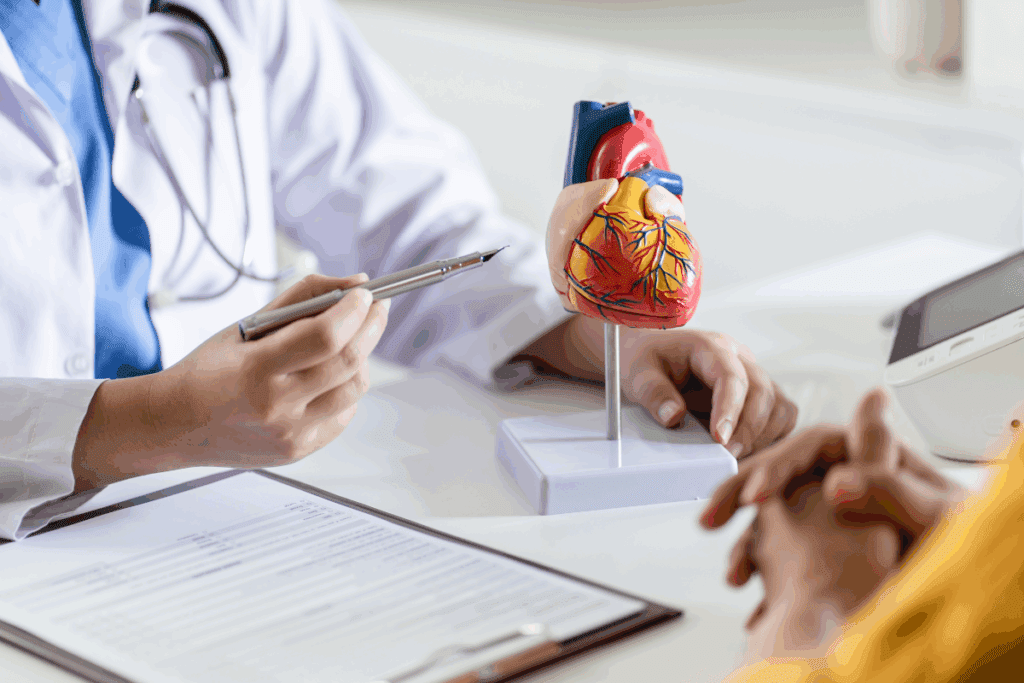Last Updated on November 25, 2025 by Ugurkan Demir

Ever thought your chest tightness or pain might be from acid reflux instead of a heart issue? At Liv Hospital, we know how key it is to find the real reason for these symptoms. Acid reflux happens when stomach acid flows back into the esophagus. This can lead to chest discomfort and burning feelingsLearn does acid reflux cause chest tightness and pain and how to relieve it effectively.
The Medical organization says noncardiac chest pain feels like heart pain but isn’t. It’s usually linked to the esophagus. We’ll look into how GERD can seem like serious heart problems and what to watch for.

It’s important to know the difference between acid reflux and GERD to treat chest tightness right. We’ll look at what these conditions are, how they differ, and what can make symptoms worse.
Acid reflux happens when the lower esophageal sphincter (LES) doesn’t close right. This lets stomach acid flow back into the esophagus. This backflow can hurt the esophagus’s lining, causing pain and discomfort.
The Medical organization says heartburn is when stomach acid flows up into the esophagus. If this happens often, it can cause more serious problems like esophagitis, which is inflammation of the esophagus.
Acid reflux is common and can happen to many people sometimes. But GERD is a more serious and ongoing version of acid reflux. It means having symptoms often and can cause serious problems if not treated.
The main differences are:
Many things can make acid reflux and GERD symptoms worse. Knowing what these are can help manage the conditions:
By knowing these triggers and the differences between acid reflux and GERD, people can manage their symptoms better and avoid serious problems.

Acid reflux starts when food doesn’t move smoothly into the stomach. This can cause stomach acid to go up into the esophagus. This leads to different symptoms.
Stomach acid goes up into the esophagus when the barrier between the esophagus and stomach weakens. This can happen for many reasons. For example, a weak lower esophageal sphincter (LES) or too much pressure in the stomach.
The LES is key to keeping stomach acid out of the esophagus. The American College of Gastroenterology says acid reflux happens when the LES doesn’t work right. If the LES is weak or relaxes too much, stomach acid can flow back into the esophagus.
When stomach acid meets the esophagus, it can irritate and damage the lining. This can cause heartburn and sometimes chest tightness. How much damage there is can affect symptoms.
Knowing how acid reflux works helps us understand why it can cause chest tightness. The link between acid reflux and chest pressure is something doctors are very interested in.
| Mechanism | Description | Symptoms |
| Stomach Acid Reflux | Stomach acid flows back into the esophagus due to a weakened LES. | Heartburn, Regurgitation |
| Esophageal Irritation | The esophageal lining is irritated by stomach acid. | Chest Tightness, Discomfort |
| Inflammation | Prolonged exposure to acid causes esophageal inflammation. | Pain, Difficulty Swallowing |
It’s important to understand how acid reflux and chest tightness are linked. Acid reflux, or GERD, can cause many uncomfortable symptoms. Chest tightness is one of them.
The Medical organization says noncardiac chest pain can feel like heart pain. GERD is a common cause of this pain. This shows why it’s key to know the difference between heart and non-heart chest pain.
When stomach acid flows back into the esophagus, it can irritate the lining. This irritation can cause inflammation and discomfort. It may feel like tightness or pressure in the chest.
Esophageal irritation is a main reason for chest tightness from acid reflux. The esophagus and heart share some nerve pathways. This can make it hard to tell the difference between heart and esophageal pain.
Esophageal irritation leading to tightness involves several factors. First, stomach acid can cause inflammation and irritation in the esophagus. This irritation can lead to muscle contractions and spasms.
Also, the inflammation can send pain signals to the brain. These signals can feel like chest tightness or discomfort. But the heart itself is not affected.
In summary, acid reflux can cause chest tightness. The link between reflux and chest sensations comes from esophageal irritation. This irritation can cause inflammation, muscle contractions, and tightness. Knowing this connection is key to managing symptoms properly.
It’s important to know about chest sensations from acid reflux for the right treatment. Acid reflux happens when stomach acid goes back up into the esophagus. This can cause many uncomfortable feelings in the chest.
Heartburn is a common chest feeling from acid reflux. It feels like a burning pain in the chest. The Medical organization says heartburn often happens after eating and can taste bitter.
This burning is from stomach acid irritating the esophagus lining.
People with acid reflux might feel pressure or tightness in their chest. This can be scary and might seem like heart problems. The tightness usually comes from the esophagus getting irritated and inflamed by stomach acid.
Feeling sore or uncomfortable behind the breastbone is common in acid reflux. This feeling can be mild or very bad. It might get worse when you’re in certain positions or after eating.
Knowing these chest feelings might mean acid reflux is important. We’ll look more into these symptoms and how to handle them next.
Chronic acid reflux can cause persistent chest tightness. This symptom greatly affects the lives of those with GERD. We will look at how acid exposure impacts chest feelings, nighttime symptoms, and the usual duration and pattern of GERD chest tightness.
GERD’s chronic acid exposure can irritate the esophagus, causing tightness and discomfort. This irritation makes the esophagus more sensitive over time. Even small acid reflux events can feel worse.
The esophagus and nearby areas can get inflamed from chronic acid. This leads to esophagitis. The inflammation causes chest pain, which might be mistaken for heart problems. The American Heart Association says chest pain can be a heart attack sign. It’s important to tell the difference between heart and non-heart causes.
Nighttime GERD symptoms can be tough, as lying down worsens acid reflux. This can make chest tightness and discomfort worse at night. It can also mess up sleep patterns, making GERD symptoms harder to manage.
Worsening symptoms at night can lead to waking up often. This reduces sleep quality. Poor sleep can harm overall health. It’s key to manage nighttime GERD symptoms well.
The length and pattern of GERD chest tightness vary among people. Some feel tightness all the time, while others have it only when triggered or during certain activities.
Knowing your symptoms’ pattern is key to managing them. Keeping a symptom diary can help find triggers and patterns. This allows for better treatment plans.
GERD and back pain are linked in a complex way. Gastroesophageal reflux disease (GERD) can cause chest pain by letting stomach acid flow up into the esophagus. But, can it also cause back pain?
Referred pain happens when pain feels like it’s coming from somewhere else. GERD can irritate the esophagus, causing pain in the chest and sometimes the back. This is because of how nerves in the spinal cord work together.
Key factors contributing to referred pain in GERD include:
GERD can cause chest pain, but its link to back pain is not as clear. Yet, some people with GERD say they have back pain, often between the shoulder blades. This back pain is often tied to GERD symptoms like heartburn and regurgitation.
| Characteristics | GERD-Related Back Pain | Other Causes of Back Pain |
| Location | Typically between the shoulder blades | Can vary, often lower back |
| Association with GERD Symptoms | Often accompanied by heartburn and regurgitation | Not typically associated with GERD symptoms |
| Nature of Pain | Can be burning or dull | Varies, can be sharp, dull, or aching |
It’s important to understand how GERD might cause back pain. If you have both chest and back pain, see your doctor. They can figure out what’s causing it and how to treat it.
Acid reflux can cause chest sensations that feel like heart problems. This can cause worry and confusion for those who experience it.
Acid reflux and heart issues share similar symptoms, making it hard to tell them apart. Both can cause chest pain or discomfort. The American Heart Association says heart attack symptoms include chest pain, shortness of breath, and arm or jaw pain. Acid reflux can also cause chest pain that spreads to the back, arms, or jaw.
Common symptoms shared by both conditions include:
Even though symptoms can be similar, there are key differences. Acid reflux symptoms often get worse after eating, and can include heartburn or regurgitation. Healthcare providers look for these differences to make a correct diagnosis.
| Characteristics | Acid Reflux | Cardiac Issues |
| Trigger Factors | Eating, lying down, certain foods | Physical exertion, stress |
| Associated Symptoms | Heartburn, regurgitation, dysphagia | Shortness of breath, nausea, lightheadedness |
| Relief Factors | Antacids, proton pump inhibitors | Nitroglycerin, rest |
Distinguishing between acid reflux and heart issues can be tricky. Healthcare providers must carefully examine medical history, perform physical exams, and run tests to figure out the cause of chest tightness. This is key to giving the right treatment.
The complexity of differential diagnosis shows why it’s important to see a doctor if symptoms don’t go away or get worse.
Acid reflux is often linked to chest pain, but it can also cause pain in other areas. This happens because of how the esophagus is connected to the spinal cord. It’s a complex process involving both visceral and somatic sensory inputs.
Yes, GERD can sometimes cause breast pain. This is because the nerves in the esophagus and chest area can overlap. According to the Medical organization, heartburn can also cause pain in the neck or jaw.
It’s important to figure out if breast pain is from GERD or something else. This could be heart problems or muscle issues. A doctor needs to check to find out the real cause.
Reflux and arm pain can be linked through referred pain. The nerves for the esophagus and arm are connected. This can make you feel pain in your arm during acid reflux episodes.
Studies show that irritation in the esophagus can send pain signals to the arm. But, arm pain from acid reflux is not common. It usually happens with other symptoms like heartburn.
| Symptom | Frequency in GERD Patients | Common Characteristics |
| Breast Pain | Uncommon | Often associated with severe heartburn |
| Arm Pain | Rare | Typically occurs with other GERD symptoms |
| Chest Tightness | Common | Can be exacerbated by lying down or bending |
Pain from acid reflux can spread beyond the chest. This is because of shared nerve pathways and complex innervation. The esophagus’s nerves can send pain signals to different areas, like the chest, back, arms, and jaw or neck.
How pain spreads can depend on individual differences and other health conditions. Understanding these mechanisms can help in diagnosing and managing symptoms better.
We know that pain experiences can vary a lot among people. A detailed approach is needed to tackle the complex symptoms of acid reflux.
Figuring out why you have chest tightness is key to feeling better. It can be caused by many things, like acid reflux or heart problems. We’ve talked about how acid reflux can cause it, but it’s important to check for other reasons too.
Doctors use tests to find out why you have chest tightness. These tests include:
The Medical organization says these tests help figure out if it’s your heart or something else. This makes sure you get the right treatment.
Knowing when to go to the emergency room is important. If you have any of these symptoms, get help right away:
“It’s always better to err on the side of caution when it comes to chest tightness,” says. This means getting medical help if you’re unsure.
“If you’re experiencing symptoms that are severe, worsening, or accompanied by other alarming signs, don’t hesitate to seek emergency care.”
Medical organization
Managing acid reflux-related chest tightness needs a mix of treatments. We’ll look at the different ways to ease symptoms and improve life quality.
Medicines are key in treating acid reflux-related chest tightness. They aim to cut down stomach acid or neutralize it. Common medicines include:
These drugs can greatly help symptoms. But, it’s important to talk to a doctor to find the right medicine and dose.
Changing your lifestyle is also vital in managing acid reflux-related chest tightness. We suggest:
By making these lifestyle changes, you can lessen your symptoms a lot.
In some cases, surgery might be needed to treat acid reflux-related chest tightness. Procedures like fundoplication can strengthen the lower esophageal sphincter and stop acid reflux.
| Treatment Option | Description | Benefits |
| Medication | Antacids, H2 blockers, PPIs | Reduces acid production, alleviates symptoms |
| Lifestyle Changes | Dietary modifications, weight management | Reduces symptoms, improves overall health |
| Surgery | Fundoplication | Strengthens lower esophageal sphincter, prevents acid reflux |
Talking to a healthcare provider is key to finding the best treatment.
Complex reflux symptoms need a team effort. At Liv Hospital, we use a team approach to manage acid reflux. This ensures our patients get care that fits their needs.
Managing complex reflux symptoms requires many specialists. These include gastroenterologists, otolaryngologists, and sometimes cardiologists or thoracic surgeons. Coordinating care between these specialists is key. It helps avoid duplicate efforts and conflicting treatments, ensuring a single plan.
Creating comprehensive treatment protocols is vital for complex reflux symptoms. These protocols include lifestyle changes, medications, and sometimes surgery.
Academic medical centers are key in managing complex reflux symptoms. They lead in research and innovation, creating new treatments and improving old ones.
By using the latest research, places like Liv Hospital offer top care. Our focus on staying updated with reflux disease management means we can give patients the best treatments.
Understanding the link between acid reflux and chest tightness is key. We’ve seen how GERD can lead to chest tightness and its symptoms.
Getting a correct diagnosis is vital. It helps tell if chest tightness is from GERD or heart issues. The Medical organization and Medical organization offer detailed guides on treating GERD and its symptoms. They stress the need for a team effort in care.
Does GERD cause chest tightness? Yes, it does. GERD can make the chest feel tight. Knowing how acid reflux affects the chest helps us find better treatments.
Managing GERD-related chest tightness needs a full plan. This includes changing lifestyle habits, using medicines, and sometimes surgery. With the help of doctors, patients can ease their symptoms and live better lives.
Yes, GERD can lead to chest and back pain. This happens when stomach acid flows back into the esophagus. It irritates the lining and causes discomfort that may feel like it’s coming from the back.
Yes, acid reflux can make your chest feel tight. This is because the esophagus gets irritated, leading to feelings of tightness and discomfort.
Yes, reflux can make your chest feel tight. This is due to stomach acid flowing back into the esophagus and irritating it.
Yes, GERD can cause chest pressure. This is because of the constant acid exposure, leading to tightness and discomfort in the chest.
Yes, acid reflux can cause your chest to feel tight. The irritation of the esophagus leads to sensations of tightness and discomfort.
Yes, reflux can cause chest pain. This pain can sometimes be mistaken for heart problems because the symptoms are similar.
Yes, GERD can cause chest tightness. This is due to the chronic acid exposure and irritation of the esophagus.
Yes, acid reflux can cause chest pressure. This is due to the irritation of the esophagus and the resulting inflammation.
Yes, GERD can cause chest tightness. This is because of the chronic nature of the condition and the ongoing irritation of the esophagus.
Yes, GERD can sometimes cause breast pain or discomfort. This is because pain from the esophagus can radiate to other areas, including the breast.
Yes, acid reflux can sometimes cause arm pain. This is because pain from the esophagus can radiate to other areas, including the arm.
Yes, acid reflux can cause tightness in the chest. This is due to the irritation of the esophagus and the resulting inflammation.
Yes, heartburn, a symptom of acid reflux, can sometimes be associated with arm pain. This is due to the radiation of pain.
Pain from acid reflux can spread beyond the chest. This is because of the complex innervation of the esophagus and the referral of pain to other areas, such as the back, breast, or arm.
Subscribe to our e-newsletter to stay informed about the latest innovations in the world of health and exclusive offers!